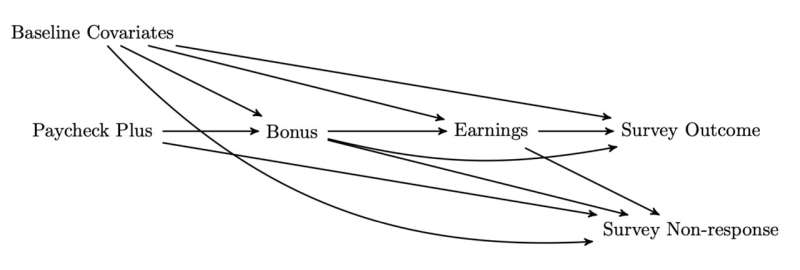This article has been reviewed according to Science X's editorial process and policies. Editors have highlighted the following attributes while ensuring the content's credibility:
fact-checked
peer-reviewed publication
trusted source
proofread
Study reveals the complex impacts of the earned income tax credit enhancements on mental and physical health

The effects of an enhanced Earned Income Tax Credit (EITC) for single adults without dependent children might damage mental health for some recipients, according to a study at Columbia University Mailman School of Public Health called the Paycheck Plus Experiment for Healthy Aging, a comprehensive study aimed at understanding the health ramifications of adjustments to the Earned Income Tax Credit, a tax credit available to low-income workers when they file taxes. The findings are published in The Milbank Quarterly.
The study which focuses on the interplay of economic incentives and health outcomes, spans multiple years and juxtaposes results from trials carried out in two cities—Atlanta and New York.
The Paycheck Plus randomized-controlled trial tested an enhanced EITC for single adults across three years in both NYC and Atlanta. The NYC trial concluded two years prior to the Atlanta one and reported positive impacts on economic, mental, and physical health for those best responding to the economic incentives.
For instance, women would gain roughly two months of perfect health if the intervention were sustained over their lifetime. Conversely, the Atlanta study revealed no significant economic benefits and, more concerningly, a potentially detrimental effect on mental health.
"A major differential in the Atlanta trial was the defunding of tax assistance centers in its second year," said Peter Muennig, MD, professor of Health Policy and Management at Columbia Public Health. "This could elucidate the absence of economic benefits in Atlanta. It raises an imperative issue: difficult-to-access social programs could not only be ineffectual but also potentially harmful."
In the Atlanta study, 3,971 participants were randomly assigned to one of two groups: a control group receiving the standard federal EITC, or a treatment group receiving an EITC supplement of up to $2,000 across three tax years (2017-2019). Data were gathered from various sources, including the Georgia Department of Labor and personal surveys. In NYC, nearly 6,000 participants were either given the standard federal EITC or received the cash supplement.
Initial results indicated a surge in earnings for the treatment group in the first year of the project in Atlanta. However, overall cumulative earnings across the 3-year study period did not significantly surpass those of the control group. Alarmingly, the treatment group also showcased markedly lower scores on two mental health assessments: the Patient Health Questionnaire 9 and the Kessler 6—two measures that improved for women in New York City.
Notably, a steeper decline in mental health may have been observed among those in the treatment group who did not receive a bonus.
According to Muennig and colleagues, the study prompts contemplation on the real-life impacts of well-intentioned welfare programs. The distress possibly associated with an attractive, yet difficult-to-obtain welfare bonus might inadvertently jeopardize participant health. "As a crucial takeaway, the design of welfare programs should pivot toward ease of access to avert potential pitfalls."
However, the authors caution that the income benefits and health impacts were relatively small in both cases, and there was imperfect follow up of participants in Atlanta. "The findings should be interpreted with some caution. Nevertheless, similar findings have been seen from other welfare experiments—those recipients who have the hardest time receiving benefits can sometimes be harmed rather than helped by welfare."
"The American welfare system is broken," states Peter Muennig, the lead author. "People who cannot work or even face difficulty applying for benefits because they are homeless, carless, have big families, or face mental or physical health challenges simply cannot get welfare. More than half of the recipients could not even file taxes to try to get the benefit."
Dr. Muennig continued, "We sometimes refer to people who cannot manage to even get stimulus checks as 'falling through the cracks.' This is too gentile. Our earlier studies on welfare reform found that they not only fell through the cracks, they sometimes fell to their death."
More information: Peter Muennig et al, The Effect of the Earned Income Tax Credit on Physical and Mental health—Results from the Atlanta Paycheck Plus Experiment, The Milbank Quarterly (2023). DOI: 10.1111/1468-0009.12675


















